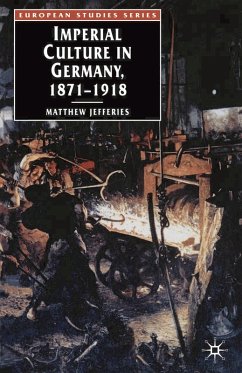It has often ben suggested that artists and writers in Germany's imperial era shunned social engagement, preferring instead apolitical introspection. However, as Matthew Jefferies reveals, whether one looks at the painters, poets and architects who helped to create an official imperial identity after 1871; the cultural critics and reformers of the later 19th century; or the new generation of cultural producers that emerged in the years around 1900, the social, political and cultural were never far apart.
In this attractively illustrated book, Jefferies provides a lively introduction to the principal movements in German high culture between 1871 and 1918, in the context of imperial society and politics. He not only demonstrates that Germany's 'Imperial culture' was every bit as fascinating as the much better known 'Weimar culture' of the 1920s, but argues that much of what came later has origins in the imperial period.
Filling a significant gap in the current historiography, this study will appeal to all those with an interest in the rich and diverse culture of Imperial Germany.
In this attractively illustrated book, Jefferies provides a lively introduction to the principal movements in German high culture between 1871 and 1918, in the context of imperial society and politics. He not only demonstrates that Germany's 'Imperial culture' was every bit as fascinating as the much better known 'Weimar culture' of the 1920s, but argues that much of what came later has origins in the imperial period.
Filling a significant gap in the current historiography, this study will appeal to all those with an interest in the rich and diverse culture of Imperial Germany.


